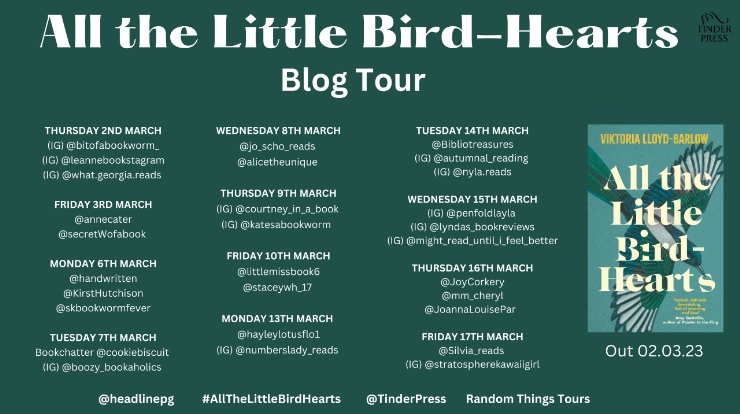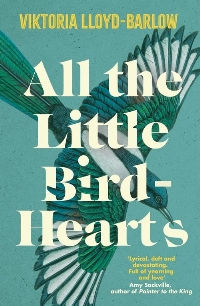Blog tour: All the Little Bird-Hearts by Viktoria Lloyd-Barlow

This post is part of a blog tour organised by Random Things Blog Tours. I received a free copy of the book in return for an honest review.
‘Sunday Forrester lives with her sixteen-year-old daughter, Dolly, in the house she grew up in. She does things more carefully than most people. On quiet days, she must eat only white foods. Her etiquette handbook guides her through confusing social situations, and to escape, she turns to her treasury of Sicilian folklore.
‘The one thing very much out of her control is Dolly – her clever, headstrong daughter, now on the cusp of leaving home.
‘Into this carefully ordered world step Vita and Rollo, a couple who move in next door, disarm Sunday with their charm, and proceed to deliciously break just about every rule in Sunday’s book. Soon they are in and out of each others’ homes, and Sunday feels loved and accepted like never before.
‘But beneath Vita and Rollo’s polish lies something else, something darker. For Sunday has something that Vita has always wanted for herself: a daughter of her own.’

In All the Little Bird-Hearts, by Viktoria Lloyd-Barlow, we follow single mother Sunday Forrester over the summer of 1988, when her daughter Dolly takes her GCSEs and the larger-than-life Vita and Rollo move into the house next door, bringing a touch of London glamour to their corner of the Lake District.
While Vita shows Sunday more kindness and acceptance than she’s accustomed to from other people, it’s Dolly she really takes under her wing, and Sunday sees less and less of her daughter, who becomes more and more of a stranger to her as the summer goes on.
Full disclosure: I’m not diagnosed as autistic, but I’ve read so much about it in my (forever inconclusive) quest to determine whether I am or not, and related to so many people’s accounts of being autistic, that it wouldn’t come as a huge surprise to me if I was.
For this reason, I could really empathise with Sunday, who (to give some examples that particularly struck a chord) favours white/beige food without overwhelming flavours or textures; has a horror of answering the phone; struggles to conceive of shopping as a leisure/social activity due to the sensory overload involved; pays great attention to the tone and rhythm of people’s speech; is puzzled and hurt when people inexplicably run hot and cold or implicitly exclude her; and gets highly absorbed in activities she enjoys and finds meaningful (in her case, tending young plants at the farm shop she works for).
Lloyd-Barlow is autistic herself, so authenticity and understanding flow through her portrayal of Sunday and her situation.
I felt so sad for Sunday as I learned how her sister Dolores (who drowned when they were both teenagers) had been the only person in her family who accepted her as she was. Sunday’s late parents blamed her for Dolores’ death, and their mother was impatient with, and cruel to Sunday because she thought that she was cold-hearted, and acting fussy and awkward on purpose.
Dolly, Vita, and Rollo accommodate Sunday’s quirks, but as the story goes on, Dolly and Vita’s references to them feel less like harmless teasing and more like mocking. This, combined with Sunday’s gradual loss of Dolly to Vita over the course of the book, was absolutely heartbreaking.
I found it interesting that, because of the way the two women present in company, many people - particularly Sunday’s wealthy, confident former in-laws, the Forresters - treat Sunday like a child, but Vita as an adult.
However, Vita, who’s spontaneous, delights in her lack of organisation, responsibility, and life skills, and has a penchant for taking things that aren’t hers and dropping people and things when she gets bored of them, is actually the more childlike of the two.
Contrastingly, Sunday has weathered repeated rejection, experienced devastating loss, held down a job (where she finds affinity with her colleague David, who is also socially excluded because he’s deaf) run a household, and raised a child on her own. I found Vita irritating, verging on unbearable after a while - I know which of the pair I’d rather spend a day with!
Throughout the book, Sunday encounters or recalls social interactions where she struggles/struggled to reply in the “correct” way, and we’re privy to her thought process as she has to manually consider how people expect her to respond to what they’ve just said, and consult the rules she’s memorised from an old social etiquette guide.
It’s only natural that, in light of these difficulties, Sunday is a consummate observer of people and social situations. Storing this information gives her a sense of safety and something to refer to and imitate in future interactions.
Lloyd-Barlow’s (and therefore Sunday’s) depictions of the various characters, both major and minor, are therefore very rich in detail. This is especially true of Vita, as the catalyst of the story who shocks and fascinates Sunday with her unapologetically OTT personality and mannerisms.
This high level of attention to detail also comes through in Sunday’s descriptions of her home and locality. I particularly enjoyed all the information about the history of Sunday and Vita’s houses, which as well as making them more “real”, is exactly the sort of thing I find interesting.
All the Little Bird-Hearts is an authentic, meticulously observed, and heartbreaking novel.
